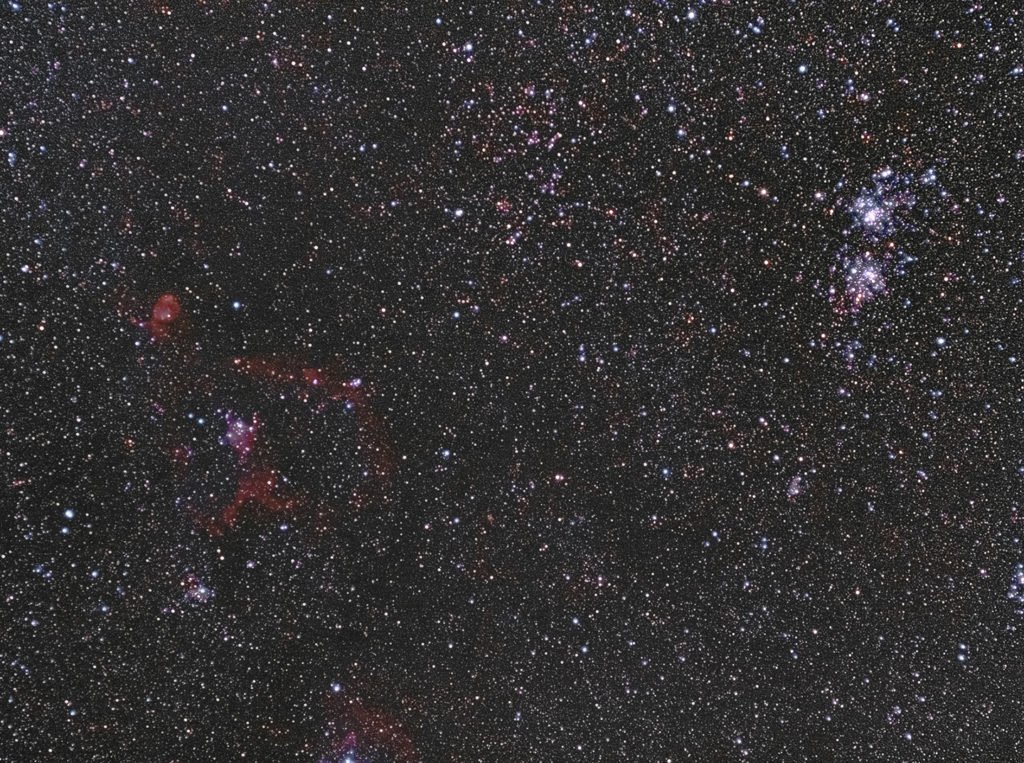The best Canon lenses for Astrophotography allow you to capture the vastness and beauty of the night sky. These Canon lenses are designed to have wide viewing angles and sharp optics, giving photographers the opportunity to explore the Milky Way through their cameras.
Our guide highlights the seven best Canon lenses for astrophotography, with RF and EF lenses available.
Our top choice is the Canon RF 15-35mm f/2.8L IS USM. With its fast aperture and wide angle focal length, it’s the best Canon lens for wide, clear views of the stars above. And if that’s not the lens for you, keep reading to see six more excellent astrophotography lenses for Canon cameras.
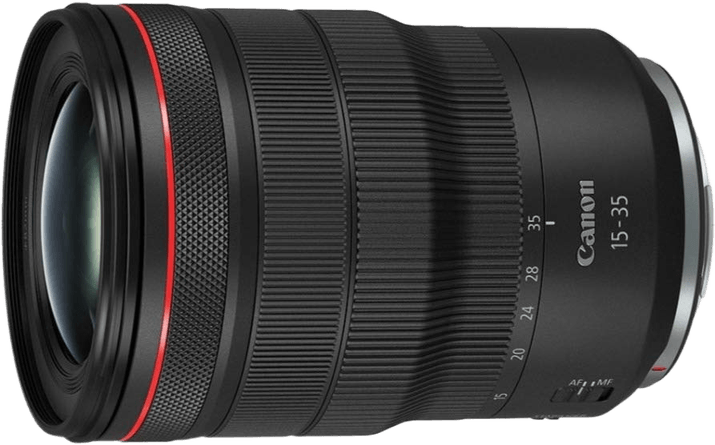
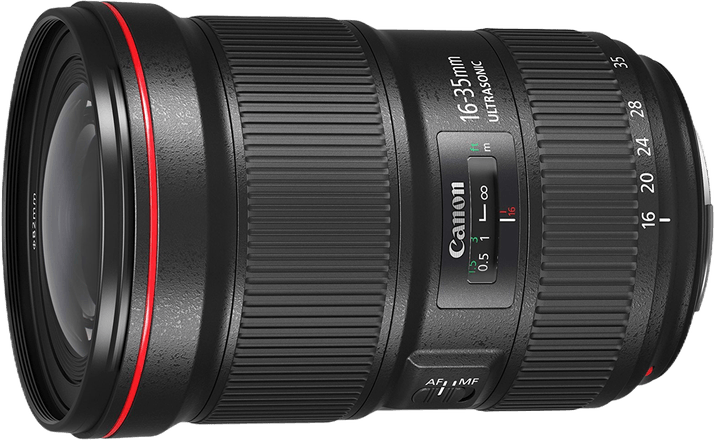
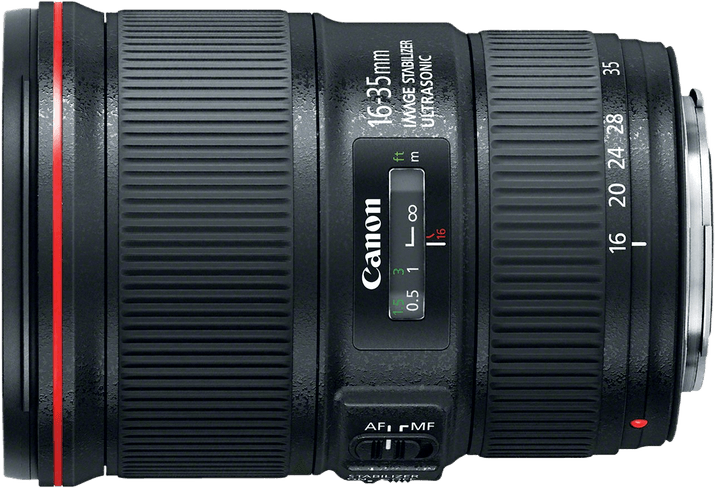
What Is the Best Canon Lens for Astrophotography?
When hunting the best Canon lens for astrophotography, factors like aperture size, focal length, and weight are the most important.
The Canon RF 15-35mm f/2.8L IS USM leads our list, offering a wide aperture and focal range ideal for capturing detailed night skies. We also have several EF lenses for Canon DSLR cameras. Other notable mentions include Sigma and Samyang lenses, chosen for their exceptional light-gathering capabilities and sharpness.
Each lens was evaluated for its ability to produce clear, distortion-free images of celestial phenomena, ensuring photographers can capture the beauty of the night sky with precision.

- Versatile 15-35mm zoom for dynamic compositions
- Bright f/2.8 aperture for low light shooting
- Robust build with weather sealing for durability
- Exceptional sharpness and minimal aberrations
- Image stabilization enhances handheld capabilities

- Constant f/2.8 for consistent low-light performance
- L-series durability with comprehensive weather sealing
- Fast, accurate autofocus ideal for dynamic scenes
- Superior sharpness and color accuracy across frame
- Ideal for landscapes, architecture, and event photography

- Constant f/4 aperture for consistent exposure control
- Image stabilization for sharp handheld shots
- L-series build quality with weather sealing
- Excellent sharpness and color rendition
- Ideal for landscapes and architectural photography
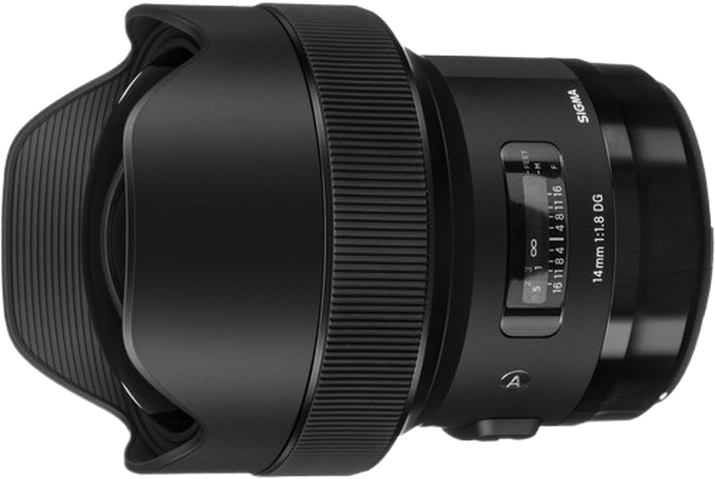
- Ultra-wide 14mm focal length captures expansive views
- Exceptional f/1.8 aperture for low-light performance
- Art series quality ensures superior image sharpness
- Ideal for astrophotography with minimal coma
- Robust build with premium, durable materials
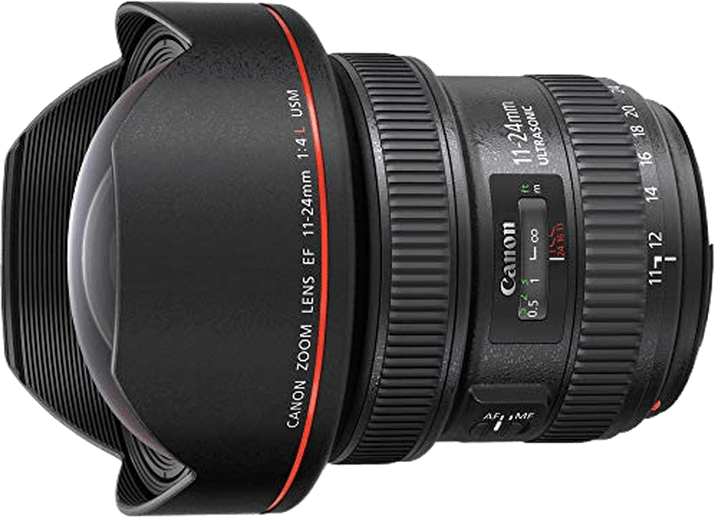
- Unprecedented 11-24mm ultra-wide zoom range
- Constant f/4 aperture across entire zoom range
- Superior L-series construction and weather sealing
- Minimal distortion for an ultra-wide lens
- Exceptional for landscape and architectural photography
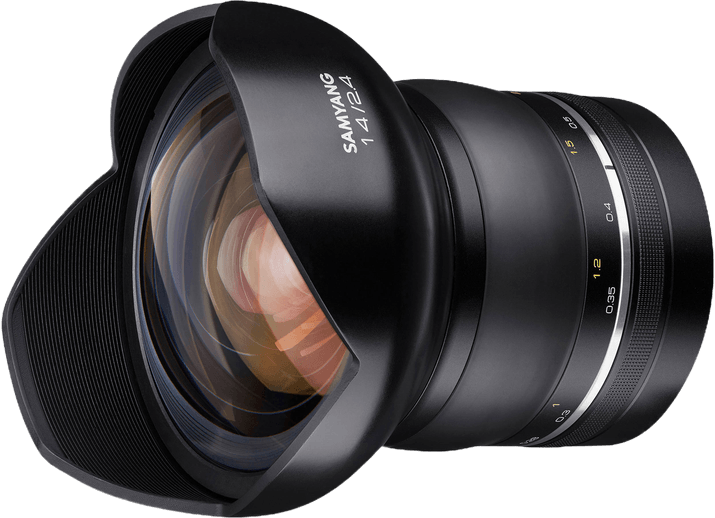
- Ultra-wide 14mm perspective for expansive compositions
- Bright f/2.4 aperture enhances low-light capability
- Exceptional sharpness and clarity across the frame
- Manual focus for precise control and creativity
- Solid construction with a premium feel
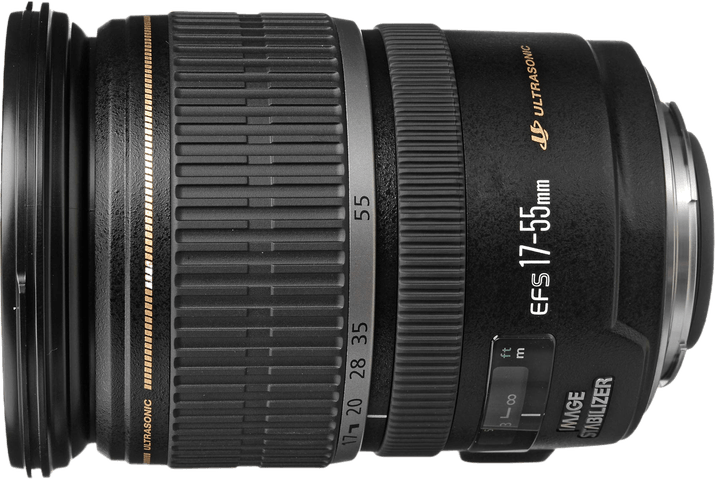
- Fast f/2.8 aperture for excellent low-light performance
- Built-in Image Stabilization for sharp handheld shots
- Versatile 17-55mm zoom range ideal for everyday use
- Superior image quality with L-series optical design
- Durable build with dust and moisture resistance
Our Favorite Canon Lenses for Astrophotography
Let’s take a closer look at our favorite Canon lenses for astrophotography. From wide apertures to sharp, edge-to-edge clarity, there’s a lens here to enhance every night sky image. Explore these options to find the perfect fit for your astrophotography adventures.
1. Canon RF 15-35mm f/2.8L IS USM

| Brand |
Brand
Canon
|
| Lens Weight |
Lens Weight
840 g
|
| Maximum Aperture |
Maximum Aperture
f/ 2.8
|
| Focal Length Range |
Focal Length Range
15-35 mm
|
| Image Stabilization |
Image Stabilization
|
The Canon RF 15-35mm f/2.8L IS USM is the best lens for astrophotography if you have a Canon mirrorless camera. It easily takes the top spot thanks to its wide maximum aperture, wide viewing angle, and sharp optical quality.
This lens lets in a lot of light, which is key for capturing clear, detailed images of the night sky. Its wide-angle view is perfect for taking in the vast star fields of the Milky Way.
This lens stands out for its edge-to-edge sharpness. Stars appear crisp across the entire image, a must for astrophotography. The lens also handles distortion well, keeping stars at the edges of the frame looking natural. Some barrel distortion is just about visible at 15mm, so it’s best to avoid the widest focal length.
It’s a bit heavy, at 1.85 lbs (840 g), which might be a concern for those using lighter tripods or traveling.
Compared to the Canon EF 16-35mm f/2.8L III USM, the RF 15-35mm f/2.8L IS USM offers similar optical quality but with the added benefit of image stabilization. This feature is helpful for low-light conditions, allowing for longer handheld exposures without blur. But a good photography tripod is absolutely essential for astrophotography.
If you have a Canon mirrorless camera, the Canon RF 15-35mm f/2.8L IS USM is the best astro lens for you. It isn’t a budget lens, but it’s a worthy investment if you want crystal-clear night sky images.
2. Canon EF 16-35mm f/2.8L III USM

| Brand |
Brand
Canon
|
| Lens Weight |
Lens Weight
790 g
|
| Maximum Aperture |
Maximum Aperture
f/ 2.8
|
| Focal Length Range |
Focal Length Range
16-35 mm
|
| Image Stabilization |
Image Stabilization
|
The Canon EF 16-35mm f/2.8L III USM is the best DSLR lens for astrophotography due to its fast aperture and wide angle of view.
This lens allows a lot of light with its fast f/2.8 max aperture, making it easier to shoot at night. It’s also constant throughout the zoom range, giving you composition flexibility without compromising light intake.
Its wide view is perfect for expansive shots of the Milky Way. However, it’s somewhat heavy at 1.74 lbs (790g), which might be a bit much for lighter setups.
Its optical sharpness is a big plus, ensuring stars look clear across the frame. This lens also keeps distortion low, which is key for natural-looking stars at the edges.
A Sub Wavelength Coating (SWC) and an Air Sphere Coating (ASC) reduce glare and improve light transmission. This gives you even cleaner images, so the stars always look tack-sharp.
The lack of image stabilization isn’t such a problem with astrophotography, as the camera will be mounted on a tripod. And while the superior USM AF drive is useful for other types of photography, you don’t need it for astro.
The Canon EF 16-35mm f/2.8L III USM is a brilliant wide-angle lens for astrophotography. It ticks every box, meeting an astrophotographer’s most vital needs.
3. Canon EF 16-35mm f/4L IS USM

| Brand |
Brand
Canon
|
| Lens Weight |
Lens Weight
615 g
|
| Maximum Aperture |
Maximum Aperture
f/ 4.0
|
| Focal Length Range |
Focal Length Range
16-35 mm
|
| Image Stabilization |
Image Stabilization
|
The Canon EF 16-35mm f/4L IS USM is a solid pick for astrophotography enthusiasts. Its f/4 aperture, while not as wide as some alternatives, still allows for effective night sky captures when paired with a good camera and the right settings.
Sharpness is key in astrophotography, and this lens delivers well across its zoom range, ensuring stars and celestial objects are captured with clarity. Minimal distortion at the wide end means stars remain pinpoints even toward the edge of your images.
The lens’s ability to handle chromatic aberration helps in keeping star colors true, avoiding unwanted fringing in high-contrast night skies.
The lens’s image stabilization is not crucial for tripod-based astrophotography. But it can be helpful for low-light shots on the go.
Weighing about 1.35 lbs (615 g), it’s relatively easy to carry for night shoots in remote locations.
The Canon EF 16-35mm f/4L IS USM offers a good balance between quality and convenience for astrophotographers. Its build and optical performance make it a reliable tool for capturing the night sky. An f/4 aperture isn’t the fastest, but it means this lens is more affordable than the EF 16-35mm f/2.8L III.
4. Sigma 14mm f/1.8 DG HSM | A for Canon EF

| Brand |
Brand
Sigma
|
| Lens Weight |
Lens Weight
1170 g
|
| Maximum Aperture |
Maximum Aperture
f/ 1.8
|
| Focal Length Range |
Focal Length Range
14 mm
|
| Image Stabilization |
Image Stabilization
|
The Sigma 14mm f/1.8 DG HSM | A stands out for astrophotography with its impressive f/1.8 aperture and edge-to-edge sharpness.
As part of Sigma’s Art line, the lens is known for its sharpness and minimal distortion, which is crucial for astrophotography. Despite its weight of 2.57 lbs (1170 g), its optical performance makes it worth the extra effort to carry, especially for photographers dedicated to capturing vast landscapes under the stars.
Its ultra-wide angle is perfect for expansive nightscapes, offering a broad view of the Milky Way or celestial events without compromising on light intake or detail. The lens handles chromatic aberration well, ensuring that stars appear as crisp points of light.
The Sigma 14mm f/1.8 DG HSM | A is a powerful tool for astrophotographers seeking to push the limits of night sky photography. It may be a third-party lens, but with a super-fast aperture and super-wide angle, it’s a brilliant choice for stargazers. And with the Canon EF mount, it’s compatible with Canon DSLR cameras.
5. Canon EF 11-24mm f/4L USM

| Brand |
Brand
Canon
|
| Lens Weight |
Lens Weight
1180 g
|
| Maximum Aperture |
Maximum Aperture
f/ 4.0
|
| Focal Length Range |
Focal Length Range
11-24 mm
|
| Image Stabilization |
Image Stabilization
|
The Canon EF 11-24mm f/4L USM lens is a game-changer for astrophotography lovers. Its ultra-wide zoom range captures vast night skies and landscapes with minimal distortion.
Its optical performance is top-notch, delivering sharp, edge-to-edge clarity that astrophotographers demand. The lens’s ability to minimize chromatic aberration enhances the quality of starlight captured, ensuring that each celestial body is depicted with precision.
Despite its f/4 aperture not being the widest, the lens gathers enough light when mounted on a tripod. SWC and ASC coatings also improve clarity and light transmission, helping you snap crisp night sky images.
Weighing in at 2.6 lbs (1.1 kg), it’s a bit heavy but manageable for those dedicated to capturing the cosmos.
The Canon EF 11-24mm f/4L USM is a beautiful super-wide-angle lens astrophotographers will love. It is one of the pricier lenses on the list. But its robust build quality and exceptional optical performance make it a popular choice for Milky Way photography.
6. Samyang XP 14mm f/2.4 for Canon EF

| Brand |
Brand
Samyang
|
| Lens Weight |
Lens Weight
791 g
|
| Maximum Aperture |
Maximum Aperture
f/ 2.4
|
| Focal Length Range |
Focal Length Range
14 mm
|
| Image Stabilization |
Image Stabilization
|
The Samyang XP 14mm f/2.4 is a lovely wide-angle prime lens for astrophotography.
Its f/2.4 aperture allows significant light intake, helping you shoot with faster shutter speeds.
The lens impresses with minimal distortion, a common challenge in wide-angle lenses. And its ability to reduce chromatic aberration, ensuring stars appear as crisp, means you get consistently sharp celestial objects.
Weighing 1.74 lbs (791 g), it’s relatively manageable for night-long shooting sessions. While lacking in weather sealing, its durable construction still promises longevity for those careful with their gear.
There’s no AF motor, so all focusing is done manually. That’s no problem for astrophotography, where you use the infinity focus setting. But it’s something to bear in mind if you’re going to use the lens for other types of photography.
The Samyang XP 14mm f/2.4 is a very useful lens for astrophotographers seeking quality and performance. Its combination of a wide aperture, excellent sharpness, and control over optical aberrations makes it an affordable choice for capturing the beauty of the night sky.
7. Canon EF-S 17-55mm f/2.8 IS USM

| Brand |
Brand
Canon
|
| Lens Weight |
Lens Weight
645 g
|
| Maximum Aperture |
Maximum Aperture
f/ 2.8
|
| Focal Length Range |
Focal Length Range
17-55 mm
|
| Image Stabilization |
Image Stabilization
|
The Canon EF-S 17-55mm f/2.8 IS USM is the best astrophotography lens if you have a Canon APS-C camera. While some APS-C models don’t have the resolution to capture the night sky in all it’s glory, using the right lens can help you out.
Its constant f/2.8 aperture allows for significant light capture. While its zoom range offers versatility, the wide aperture is particularly beneficial for low-light conditions, making it easier to capture sharp images of celestial phenomena without resorting to excessively high ISO settings.
Weighing 1.42 lbs (645 g), this lens is relatively easy to handle during long nights of shooting. The lack of weather sealing requires caution in outdoor conditions, but its solid build quality can withstand regular outdoor use.
Its optical performance is impressive, with the ability to maintain sharpness and control chromatic aberration throughout the focal range. This ensures stars appear as crisp points of light against the black backdrop of the night sky.
The Canon EF-S 17-55mm f/2.8 IS USM is a versatile lens that’s ideal for astrophotography beginners. Its wide aperture, effective image stabilization, and zoom flexibility make it the perfect partner for your APS-C Canon camera.
Conclusion: The Best Canon Lenses for Astrophotography
With the best Canon lens for astrophotography, capturing breathtaking night sky images has never been easier. We’ve covered a wide range of lenses, all of which are perfect for Milky Way photography thanks to their wide angles and fast apertures.
The Canon RF 15-35mm f/2.8L IS USM is our top choice thanks to its fast, constant aperture and wide-angle focal length. It’s perfect for capturing all the details of the night sky with your Canon mirrorless camera. But if you’re still using a DSLR, you can pick any of the six Canon EF lenses on the list.




